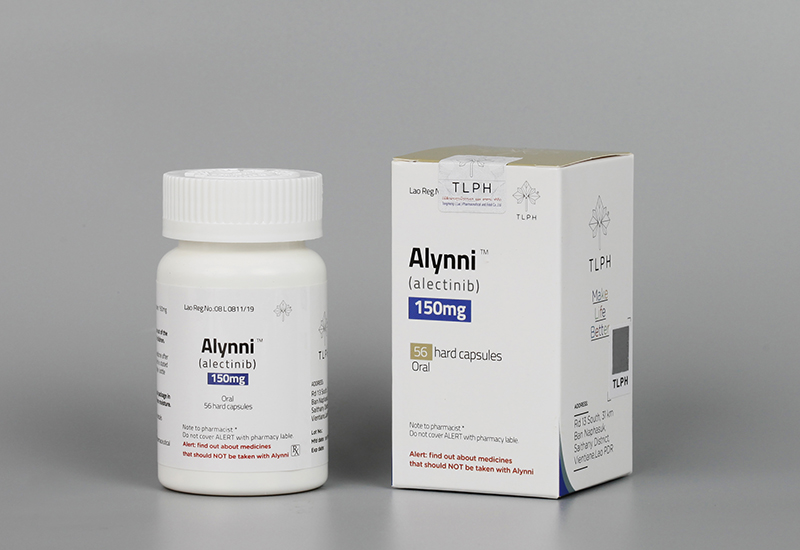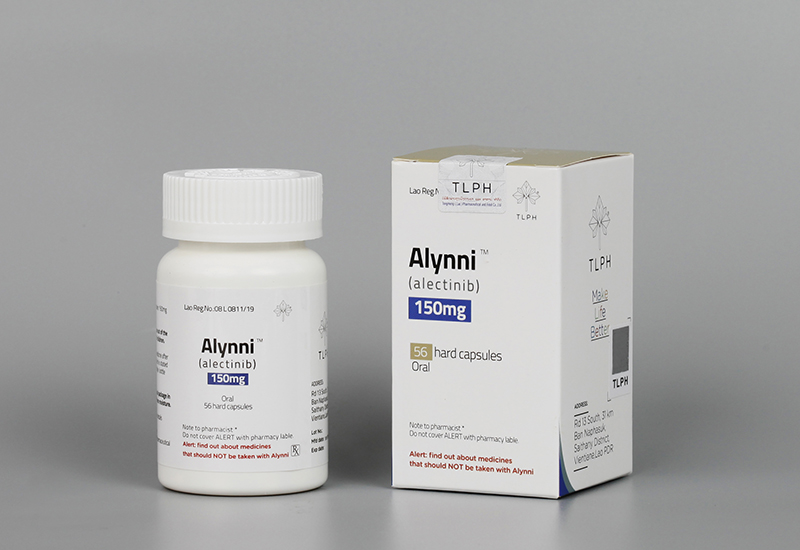


Alynni (alectinib) is a cancer medicine that contains the active substance alectinib.
Alynni (alectinib) is a kinase inhibitor indicated for the treatment of patients with anaplastic lymphoma kinase (ALK)-positive metastatic non-small cell lung cancer (NSCLC).
-----------------------DOSAGE AND ADMINISTRATION ----------------------
600 mg orally twice daily. Alynni (alectinib) with food.
--------------------- DOSAGE FORMS AND STRENGTHS---------------------
Capsules: 150 mg
Table 1. Dose reduction schedule Dose level
Starting dose 600 mg taken orally twice daily
First dose reduction 450 mg taken orally twice daily
Second dose reduction 300 mg taken orally twice daily

Table 2: ALYNNI (ALECTRNIB) Dose Modifications for Adverse Reactions
Criteriaa | Alynni (alectinib)Dose Modification |
ALT or AST elevation of greater than 5 times upper limit of normal (ULN) with total bilirubin less than or equal to 2 times ULN | Temporarily withhold until recovery to baseline or to less than or equal to 3 times ULN, then resume at reduced dose as per Table 1. |
ALT or AST elevation greater than 3 times ULN with total bilirubin elevation greater than 2 times ULN in the absence of cholestasis or hemolysis | Permanently discontinue Alynni (alectinib). |
Total bilirubin elevation of greater than 3 times ULN | Temporarily withhold until recovery to baseline or to less than or equal to 1.5 times ULN, then resume at reduced dose as per Table 1. |
Any grade treatment-related interstitial lung disease (ILD)/pneumonitis | Permanently discontinue Alynni (alectinib). |
Grade 3 renal impairment | Temporarily withhold until serum creatinine recovers to less than or equal to 1.5 times ULN, then resume at reduced dose. |
Grade 4 renal impairment | Permanently discontinue Alynni (alectinib). |
Symptomatic bradycardia | Withhold Alynni (alectinib) until recovery to asymptomatic bradycardia or to a heart rate of 60 bpm or above. If contributing concomitant medication is identified and discontinued, or its dose is adjusted, resume Alynni (alectinib) at previous dose upon recovery to asymptomatic bradycardia or to a heart rate of 60 bpm or above. If no contributing concomitant medication is identified, or if contributing concomitant medications are not discontinued or dose modified, resume AAlynni (alectinib) at reduced dose (see Table 1) upon recovery to asymptomatic bradycardia or to a heart rate of 60 bpm or above. |
Bradycardiab (life-threatening consequences, urgent intervention indicated) | Permanently discontinueAlynni (alectinib) if no contributing concomitant medication is identified. If contributing concomitant medication is identified and discontinued, or its dose is adjusted, resume Alynni (alectinib) at reduced dose (see Table 1) upon recovery to asymptomatic bradycardia or to a heart rate of 60 bpm or above, with frequent monitoring as clinically indicated. Permanently discontinue Alynni (alectinib) in case of recurrence. |
CPK elevation greater than 5 times ULN | Temporarily withhold until recovery to baseline or to less than or equal to 2.5 times ULN, then resume at same dose. |
CPK elevation greater than 10 times ULN or second occurrence of CPK elevation of greater than 5 times ULN | Temporarily withhold until recovery to baseline or to less than or equal to 2.5 times ULN, then resume at reduced dose as per Table 1. |
a ALT = alanine transaminase; AST = aspartate transaminase; ULN = upper limit of normal; ILD = interstitial lung
disease; CPK = blood creatine phosphokinase
b Heart rate less than 60 beats per minute (bpm)